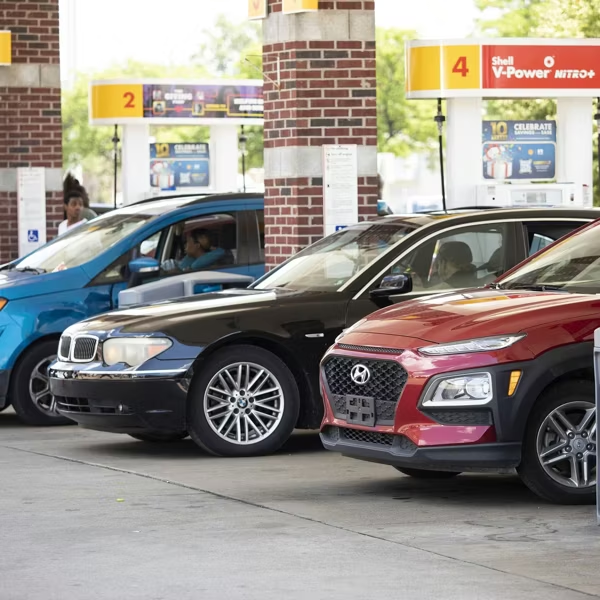New Jersey on Tuesday joined eight other U.S. states in committing to phase out new gasoline-powered light-duty motor vehicles by 2035 as a key part of the fight against pollution and global heating—which is primarily caused by burning fossil fuels.
Democratic N.J. Gov. Phil Murphy and state Department of Environmental Protection Commissioner Shawn M. LaTourette
announced that they're adopting the Advanced Clean Cars II (ACCII) Rule—developed by California authorities to achieve 100% new zero-emission vehicle sales in 2035—"setting the state on the road toward better air quality and cleaner choices for new car buyers while combating the worsening climate crisis."
The phaseout—which won't begin for a few years—is seen as a major boost for electric vehicles (EVs) and clean power in the state.
As Murphy's office explained:
The rule will take effect starting in model year 2027, providing time for auto industry transition and continued development of charging infrastructure and a more robust and cleaner electrical grid in New Jersey. It does not ban gasoline cars, nor does it force consumers to buy EVs. Rather, the rule will provide certainty to vehicle manufacturers, suppliers, utilities, and charging infrastructure companies to make the long-term investments that will be crucial to large-scale deployment of light-duty [zero-emission vehicles] and consumer choice.
"The steps we take today to lower emissions will improve air quality and mitigate climate impacts for generations to come, all while increasing access to cleaner car choices," Murphy said in a statement. "Indeed, together with my administration's continuing investments in voluntary electric vehicle incentives, charging infrastructure, and the green economy, these new standards will preserve consumer choice and promote affordability for hardworking New Jerseyans across the state."
LaTourette said that "cleaner cars and trucks mean cleaner air for our children and families, because the tailpipes of our own vehicles are a leading cause of poor local air quality."
"As New Jersey transitions to a zero-emission vehicle future, we will improve our quality of life and public health," LaTourette added. "At the same time, we will reduce climate pollutants from the transportation sector, the greatest source of planet-warming pollution in New Jersey and the nation."
Local Democratic leaders, green groups, and climate campaigners welcomed Murphy's announcement.
"As Newark continuously moves toward a healthier and more economically successful community, we welcome the Advanced Clean Cars II Rule, knowing it will reduce emissions that degrade our environment and cause respiratory problems like asthma," Newark Mayor Ras Baraka said.
"As the largest automobile transportation hub and energy generation center in the state, Newark has much to gain through this rule, through greater investment into [zero-emission vehicles], more jobs for city residents, and more availability of these vehicles for motorists," he added.
"This is a huge win not only for the environment, but for public health and the communities who suffer every day from the pollution from congested roadways."
Anjuli Ramos-Busot, director of the New Jersey Sierra Club, called the adoption of ACCII "a historic and monumental step in our transition toward a cleaner transportation sector, and carbon and co-pollutant emission reductions."
"This is a huge win not only for the environment, but for public health and the communities who suffer every day from the pollution from congested roadways," she added.
While the New Jersey Business and Industry Association
opposes the adoption of ACCII, Richard Lawton, executive director of the N.J. Sustainable Business Council, welcomed the move, asserting that "consumers and companies are experiencing firsthand how EVs are cleaner, technologically superior, and less costly to operate and maintain than internal combustion engines."
"By accelerating the growth of the EV market, ACCII will spur continued investment and innovation in the transition to a clean energy transportation sector," Lawton added. "Thanks to this decision, New Jersey can look forward to increased economic development, more good-paying jobs, and cleaner air."
New Jersey joins California, Connecticut, Maryland, Massachusetts, New York, Oregon, Rhode Island, and Washington state in committing to adopt the ACCII rule.
Meanwhile at the federal level, the Biden administration earlier this year proposed a rule aimed at ensuring that as many as two-thirds of all new light- and medium-duty passenger vehicles sold in the U.S. by 2032 are EVs.
A report published last year by the American Lung Association concluded that, in addition to slowing global heating, a nationwide transition to zero-emission vehicles and renewable electricity would bring $1.2 trillion in public health benefits to the United States over the next 30 years.




